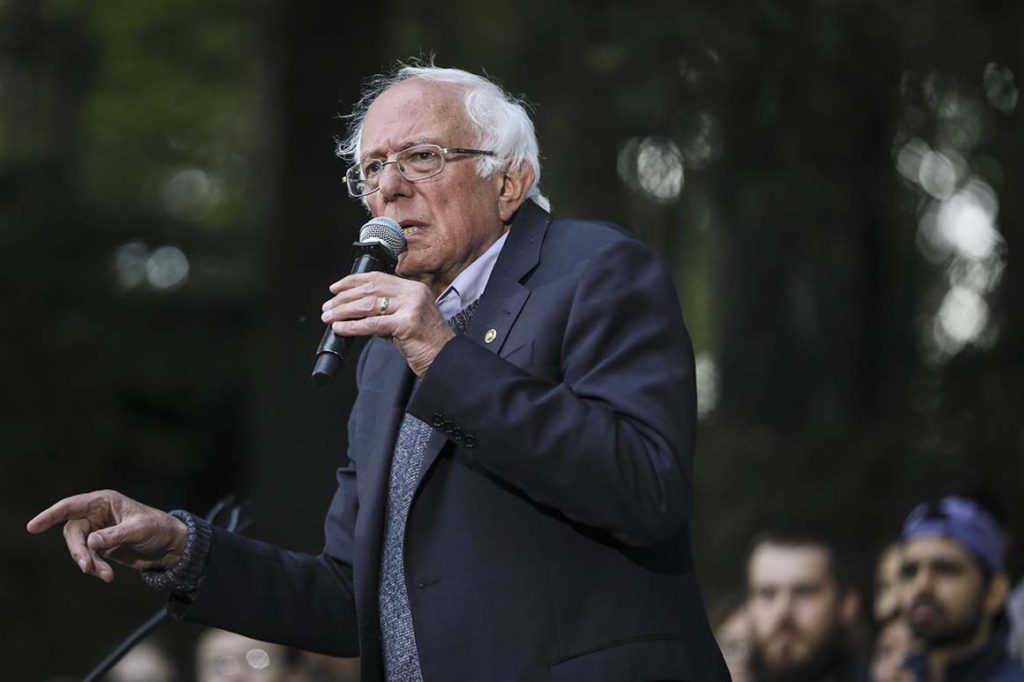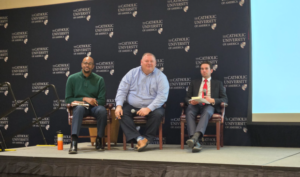Is the Most Formidable Threat to Bernie Sanders’ Campaign His Own Heart?

Democratic presidential candidate Sen. Bernie Sanders, I-Vt., campaigns Sunday, Sept. 29, 2019 at Dartmouth College in Hanover, N.H. (AP Photo/ Cheryl Senter)
By Eva Lynch
According to NBC News, U.S. Senator and presidential hopeful Bernie Sanders has returned home to Vermont to recuperate after suffering a heart attack while campaigning in Las Vegas last Tuesday. Though the Sanders campaign has not made any public statements yet, they show no indication of pulling out of the race.
Sanders was admitted to a hospital in Paradise, Nevada following chest pains, and was treated for what was first thought to be a blocked artery. However, on Friday, his campaign released his doctor’s diagnosis of a myocardial infarction, a medical term for a heart attack. Sanders was discharged on Friday.
A politician suffering a heart attack is not an unfamiliar headline to US voters and the times when it has happened before, heart attacks had little to no effect on a politicians’ viability to serve in office.
However, having run two presidential campaigns in which his age was a severely contingent issue, Senator Sanders inevitably faces questions regarding his vitality and stamina upon his return to the campaign trail. Even though he is one of three septuagenarians in the running for the Democratic nomination, critics argue that many factors contribute to Sanders’ specific medical problems being more of an issue among voters than previous politicians’. These factors include his demanding job as a Senator and the level of competition in this specific primary, due to the number of candidates running as well as the opponent which they will ultimately face next year. Further, critics claim the timing of this disruption amidst urges to buttress voter support and answer challenges from his counterparts Biden and Warren.
Critics expect that Sanders will be under intense scrutiny upon his return to the campaign trail.
“Bernie will be scrutinized very carefully in the next month or two for his ability to come back and campaign as vigorously as he has done in the 2016 and current presidential campaigns,” said Ed Rollins, a former adviser to President Ronald Reagan.
Rollins also predicts that Sanders will be looked at differently for anything less than perfection, like appearing tired after a rally or stuttering during his performance on stage.
So far, Sanders’ hospitalization left voters wondering if Sanders’ potential presidency will be characterized by similar hospitalizations. According to cardiologist Dr. Christopher P. Cannon, though patients of his age are statistically at a higher risk for cardiac events following a heart attack, Sanders exhibits few indications of future heart problems outside of high blood pressure and diabetes.
On Monday, Sanders stepped out for a walk with his wife Jane in Burlington, Vermont, and told reporters he is trying to work but is primarily focused on getting back into a routine of taking a walk every day.
Criticisms have arisen, transcending the gap between the Democratic and Republican parties, primarily slamming Sanders and his aides for failing to announce his heart attack, arguing this is inconsistent with the transparent persona Sanders has cultivated.
According to Politico, the Sanders campaign hopes that a strong performance in the upcoming debate as well as plans to highlight how his procedures show the need and potential benefits of a Medicare for All plan.








